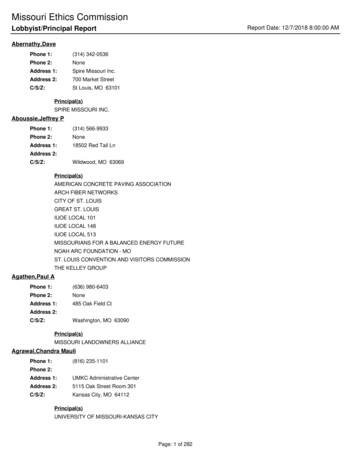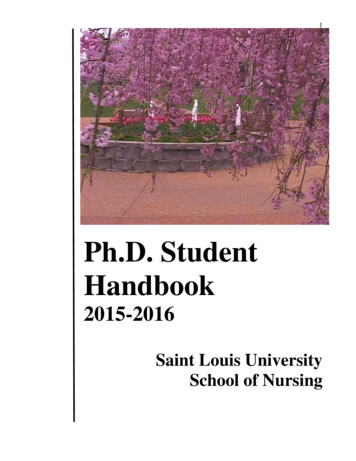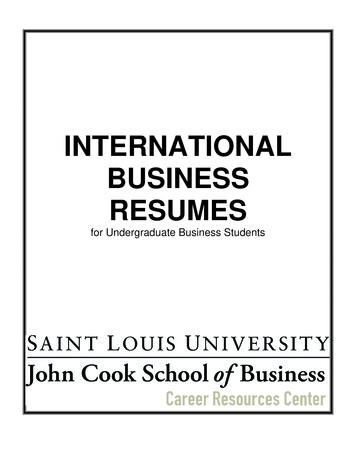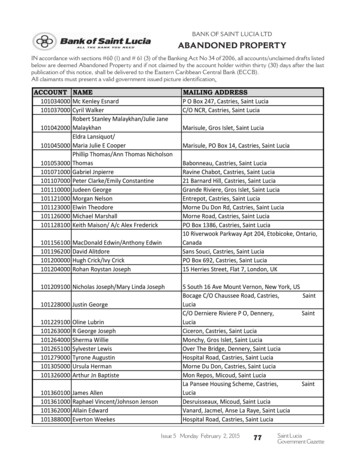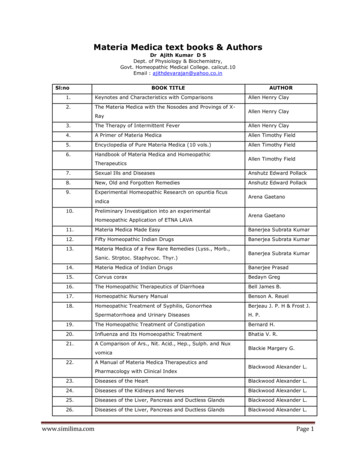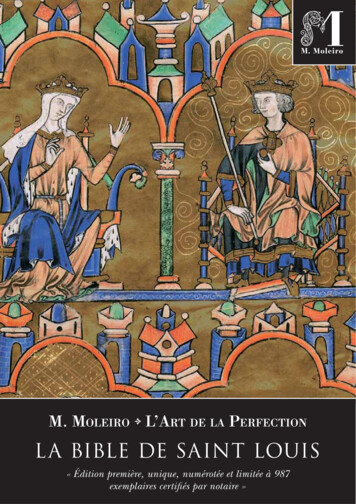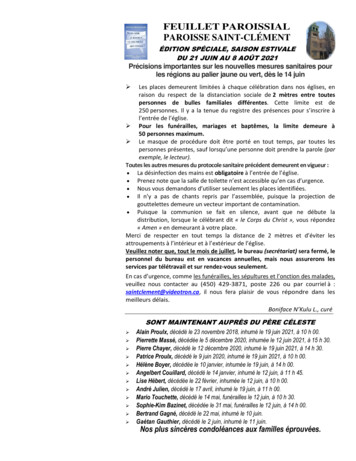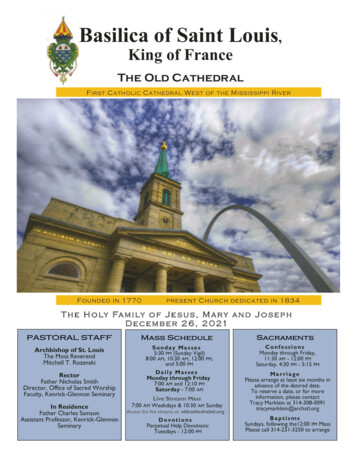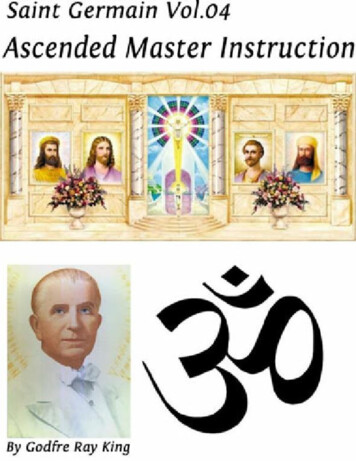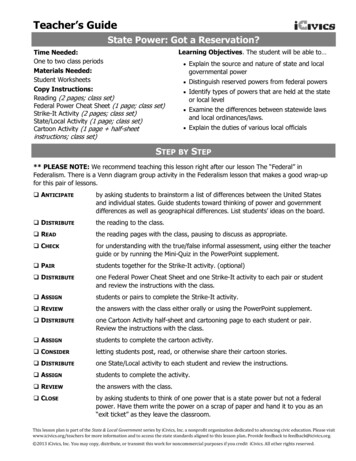
Transcription
Teacher’s GuideState Power: Got a Reservation?Time Needed:One to two class periodsMaterials Needed:Student WorksheetsCopy Instructions:Reading (2 pages; class set)Federal Power Cheat Sheet (1 page; class set)Strike-It Activity (2 pages; class set)State/Local Activity (1 page; class set)Cartoon Activity (1 page half-sheetLearning Objectives. The student will be able to Explain the source and nature of state and localgovernmental power Distinguish reserved powers from federal powers Identify types of powers that are held at the stateor local level Examine the differences between statewide lawsand local ordinances/laws. Explain the duties of various local officialsinstructions; class set)STEP BY STEP** PLEASE NOTE: We recommend teaching this lesson right after our lesson The “Federal” inFederalism. There is a Venn diagram group activity in the Federalism lesson that makes a good wrap-upfor this pair of lessons. ANTICIPATEby asking students to brainstorm a list of differences between the United Statesand individual states. Guide students toward thinking of power and governmentdifferences as well as geographical differences. List students’ ideas on the board. DISTRIBUTEthe reading to the class. READthe reading pages with the class, pausing to discuss as appropriate. CHECKfor understanding with the true/false informal assessment, using either the teacherguide or by running the Mini-Quiz in the PowerPoint supplement. PAIRstudents together for the Strike-It activity. (optional) DISTRIBUTEone Federal Power Cheat Sheet and one Strike-It activity to each pair or studentand review the instructions with the class. ASSIGNstudents or pairs to complete the Strike-It activity. REVIEWthe answers with the class either orally or using the PowerPoint supplement. DISTRIBUTEone Cartoon Activity half-sheet and cartooning page to each student or pair.Review the instructions with the class. ASSIGNstudents to complete the cartoon activity. CONSIDERletting students post, read, or otherwise share their cartoon stories. DISTRIBUTEone State/Local activity to each student and review the instructions. ASSIGNstudents to complete the activity. REVIEWthe answers with the class. CLOSEby asking students to think of one power that is a state power but not a federalpower. Have them write the power on a scrap of paper and hand it to you as an“exit ticket” as they leave the classroom.This lesson plan is part of the State & Local Government series by iCivics, Inc. a nonprofit organization dedicated to advancing civic education. Please visitwww.icivics.org/teachers for more information and to access the state standards aligned to this lesson plan. Provide feedback to feedback@icivics.org. 2013 iCivics, Inc. You may copy, distribute, or transmit this work for noncommercial purposes if you credit iCivics. All other rights reserved.
State Power: Got a Reservation?Name:States Have PowerIf you’ve ever been to a wedding, you probably heard the officiantwrap things up by saying, “By the power vested in me by the Stateof , I now pronounce ” The person performing thewedding got the power to perform weddings from the state. Butwhere did the state get the power to give that power?Little Countries?In many ways, states are independentand govern themselves.If you look up “state” in the dictionary, one of the definitions willsound a lot like the definition for “country.” That’s because state isanother word for country or nation. A state is a political unit thathas the authority to govern itself. The United States is a group ofstates that decided to unite themselves under a single government.When states do that, they are not considered countries. And yet they have their own governments. And they have their own power.The Constitution treats states partly as if they were independentcountries and partly as small units within one big country. It letsstates have power to do a lot of things, but it gives some powersonly to the federal government.Hey—That’s Reserved!The Constitution gives a specific list of powers to thefederal government. But even if you read the entireConstitution, you won’t find a list of powers for states.Instead, the Constitution says this:Delegated means assigned or given. Reserved means setaside for. So under the Constitution, if a power isn’tspecifically given to the federal government, it’s a powerset aside for the states—unless the Constitution says it’ssomething states aren’t allowed to do. There are noreserved powers for the federal government. It only hasthe powers the Constitution says it has.Aw, That’s No FunSo what can’t states do? You might want a cool title, like Sir Brandonor Princess Kaitlyn, but you won’t be getting one from your stategovernment—it’s not allowed. Granting titles of nobility is one ofmany things the Constitution says states can’t do. (It’s alsosomething the federal government can’t do.) Other no-no’s includethings that would interfere with the federal government’s ability toexercise its own powers. These are things like making treaties withother countries or starting a war. The Constitution also says “no” tostates causing problems for other states. For example, a state can’tcharge taxes on goods brought in from other states.Reading p.1
State Power: Got a Reservation?Name:Go For It!So what powers have the green light for states? That’s like saying youcan’t have pizza, tacos, or mac & cheese for dinner—now go listeverything you can have. There are lots of powers the Constitution doesn’tsay anything about at all. There’s nothing about education, health care,fire protection, police, marriage, driver’s licenses, how many dogs you canhave, what happens to your stuff when you die, or whether skateboardsare allowed at the park. State and local governments have the power tomake rules about all that and much, much more. They exercise this powerby adopting constitutions of their own and by passing their own laws.Share and Share AlikeWhat if the Constitution says the federal government can do something butdoesn’t say states can’t do it? For example, the Constitution gives thefederal government the right to collect taxes, but it doesn’t say states can’tcollect taxes. Does that mean they can both collect taxes? In this case,yes. One collecting taxes doesn’t stop the other from collecting taxes.Shared powers are called concurrent powers. (Concurrent means “at thesame time.”) States can’t share a power the Constitution gives only to thefederal government. And if sharing a power would cause a conflict, thenthe power can’t be shared. Other concurrent powers include running acourt system, enforcing laws, and borrowing money.Speaking of Local Governments.The Constitution says nothing about counties, cities, towns, boroughs, orany other small unit of government. It’s up to states to decide what kindsof smaller governments to create and what powers those localgovernments will have. States rely on local government to deliver certainkinds of services to people. That’s because the smaller the unit ofgovernment, the closer that government is to the people. States also givelocal governments the power to make their own decisions about thingslike whether your dog needs to be on a leash or whether UglyMart canbuild a 100-foot purple store downtown. Local governments are alsousually empowered to collect property and sales taxes.State Power and Federal FundingSometimes the federal government would like to pass a nationwide law,but because of the state/federal power split, it can’t. But in some cases, itcan influence states to change their own laws. This is because, over time,cash-strapped states have become more and more dependent on federalmoney in order to provide services to state citizens. One example isfederal highway funds. Years ago, research showed many fatal accidentswere caused by young people who had been drinking. The federalgovernment didn’t have the power to raise the drinking age—so in 1984 ittold states they would not receive highway funds unless they raised thestate drinking age to 21. All the states have complied.Federal money is a controversialsubject. Some believe the federalgovernment should not restricthow states use federal money.Others believe restrictions are animportant tool.Reading p.2
State Power: Got a Reservation?Name:INFORMAL ASSESSMENT: TRUE/FALSEDirections. Read each statement aloud. Have the class answer “true” or “false” as a chorus. Listen for amix of answers, indicating confusion. Alternatively, have students show thumbs-up for true and thumbsdown for false. Use each statement as an opportunity for a quick review before moving on.1. The states in the United States are individual countries. (F — they are similar, but thestates have given some power to the federal government)2. The Constitution gives a specific list of powers to the federal government. (T)3. The Constitution gives a specific list of powers to the states. (F — States have all thepowers that aren’t specifically given to the federal government)4. “Concurrent” powers are the powers that only states have. (F — concurrent powers areshared by both the states and the federal government)5. The Constitution lists some specific things states can’t do. (T)6. States do not have their own constitutions or laws. (F — they have both!)7. The Constitution doesn’t say anything about local governments. (T)8. Local governments have their own power to make decisions about anything. (F — theyonly have the powers states give them)9. Laws at a lower level of government are always superior to laws at a higher level. (F —it’s the other way around)10. The federal government can influence states by attaching rules to federal money. (T)Informal Assessment
State Power: Got a Reservation?Name:Activity: Strike It! Things are getting out of control in the state of Pendiana. Thestate legislature has seriously overreached its power with its new set of laws!1) Read Pendiana’s new laws and compare them to the Federal Power Cheat Sheet.2) Then STRIKE (cross out) any law that the state of Pendiana does not have the power to pass.(Careful: Some powers are concurrent, so both states and the federal government have them.)LAWS OF THE STATE OF PENDIANAA. Weights and Measures. The standards of measure in the state of Pendiana shall be:Length: handsWeight: stonesVolume: hogsheadsB. Vehicles. All vehicles owned by citizens of Pendiana must be registered with the state.Registration must be renewed each year.C. International Relations.War. By a 3/4 vote, the legislature of the State of Pendiana may declare war on anysovereign nation of the world.Treaties. The Governor of Pendiana may negotiate treaties with other nations.D. Education. The State of Pendiana shall provide a free education to every child.E. Taxes. Tax rates for the State of Pendiana shall be:Income Tax: 5%Property Tax: 2.5%Sales Tax: 3%In addition, there shall be a tax of 10% on all goods manufactured in any stateexcept Pendiana.F. Local Governments. Every city in the State of Pendiana must provide its own policeforce inside city limits.G. Courts. For each county of the state, there shall be a superior court. One judge shall beappointed for each 30,000 residents.H. Immigration. No citizen of a foreign country may live or work in the state withoutpassing the Pendiana Citizenship Knowledge Test.I. Cities & Towns. Each city and town in the state shall adopt a long-range general planfor growth and development.J. Animal Shelters. Each county shall maintain a shelter for lost or stray animals.K. International Commerce. A 20% charge will be added to all products manufacturedoutside the United States of America and sold in the state of Pendiana.Strike It! Activity
State Power: Got a Reservation?Name:Federal Power Cheat Sheet
State Power: Got a Reservation?Name:Eight for the State. Choose 8 of the following state powers and create a fun story that involves all 8powers in some way. Tell your story by drawing an 8-frame cartoon. Eight for the State CartoonState Power: Got a Reservation?Name:Eight for the State. Choose 8 of the following state powers and create a fun story that involves all 8powers in some way. Tell your story by drawing an 8-frame cartoon. Eight for the State Cartoon
State Power: Got a Reservation?Eight for the State Cartoon
State Power: Got a Reservation?A. State or Local? Some laws are intended toapply to everyone in an entire state, while otherlaws make more sense applied to a smaller, localarea. Can you tell which is which? Read each lawbelow and decide whether it sounds like a statelaw or a local ordinance (law), rule, or policy.Name:B. Local Officials. Local officials are responsiblefor carrying out local laws. But who does what?Match these local officials with the services theyare responsible for. Write the letter of the officialon the box he or she is standing on.1) No one living in the area may breed livestockof any kind. LOCALor STATE2) It is unlawful to turn water service on or offwithout approval. LOCALor STATE3) Every child between ages 6 and 16 mustattend a school or be homeschooled. LOCALor STATE4) Temporary structures such as circus tents maynot be put up without approval. LOCALor STATE5) A person between ages 16 and 18 must have aparent’s permission in order to get married. LOCALor STATE6) It is against the law to change or destroy anysidewalks without first receiving approval. LOCALor STATE7) At any time between sunset and sunrise,vehicles on the road must have theirheadlights on. LOCALor STATE8) All sidewalks, buildings, fences, signs, andother surfaces must be kept free from graffiti. LOCALor STATE9) Elementary school begins at 8:30 a.m. and themiddle and high school begins at 7:30 a.m. LOCALor STATE10) It is unlawful to take, injure, or harass anybird upon its nest, except in agriculture. LOCALor STATEState/Local Activity
State Power: Got a Reservation?**Name:TEACHER GUIDE **Activity: Strike It! Things are getting out of control in the state of Pendiana. Thestate legislature has seriously overreached its power with its new set of laws!1) Read Pendiana’s new laws and compare them to the Federal Power Cheat Sheet.2) Then STRIKE (cross out) any law that the state of Pendiana does not have the power to pass.(Careful: Some powers are concurrent, so both states and the federal government have them.)LAWS OF THE STATE OF PENDIANAA. Weights and Measures. The standards of measure in the state of Pendiana shall be:Length: handsWeight: stonesVolume: hogsheadsB. Vehicles. All vehicles owned by citizens of Pendiana must be registered with the state.Registration must be renewed each year.C. International Relations.War. By a 3/4 vote, the legislature of the State of Pendiana may declare war on anysovereign nation of the world.Treaties. The Governor of Pendiana may negotiate treaties with other nations.D. Education. The State of Pendiana shall provide a free education to every child.E. Taxes. Tax rates for the State of Pendiana shall be:Income Tax: 5%Property Tax: 2.5%Sales Tax: 3%In addition, there shall be a tax of 10% on all goods manufactured in any stateexcept Pendiana.F. Local Governments. Every city in the State of Pendiana must provide its own policeforce inside city limits.G. Courts. For each county of the state, there shall be a superior court. One judge shall beappointed for each 30,000 residents.H. Immigration. No citizen of a foreign country may live or work in the state withoutpassing the Pendiana Citizenship Knowledge Test.I. Cities & Towns. Each city and town in the state shall adopt a long-range general planfor growth and development.J. Animal Shelters. Each county shall maintain a shelter for lost or stray animals.K. International Commerce. A 20% charge will be added to all products manufacturedoutside the United States of America and sold in the state of Pendiana.Strike It! Activity
State Power: Got a Reservation?A. State or Local? Some laws are intended toapply to everyone in an entire state, while otherlaws make more sense applied to a smaller, localarea. Can you tell which is which? Read each lawbelow and decide whether it sounds like a statelaw or a local ordinance (law), rule, or policy.**Name:TEACHER GUIDE **B. Local Officials. Local officials are responsiblefor carrying out local laws. But who does what?Match these local officials with the services theyare responsible for. Write the letter of the officialon the box he or she is standing on.1) No one living in the area may breed livestockof any kind. LOCALor STATE2) It is unlawful to turn water service on or offwithout approval. LOCALor STATEE3) Every child between ages 6 and 16 mustattend a school or be homeschooled. LOCALor STATE4) Temporary structures such as circus tents maynot be put up without approval. LOCALorJ STATEH5) A person between ages 16 and 18 must have aparent’s permission in order to get married. LOCALor STATEG6) It is against the law to change or destroy anysidewalks without first receiving approval. LOCALor7) At any time between sunset and sunrise,vehicles on the road must have theirheadlights on. LOCALorD STATEC STATE8) All sidewalks, buildings, fences, signs, andother surfaces must be kept free from graffiti. LOCALor STATEFI9) Elementary school begins at 8:30 a.m. and themiddle and high school begins at 7:30 a.m. LOCALor STATE10) It is unlawful to take, injure, or harass anybird upon its nest, except in agriculture. LOCALor STATEABState/Local Activity
federal government. And if sharing a power would cause a conflict, then the power can't be shared. Other concurrent powers include running a court system, enforcing laws, and borrowing money. State Power and Federal Funding Sometimes the federal government would like to pass a nationwide law, but because of the state/federal power split, it .
